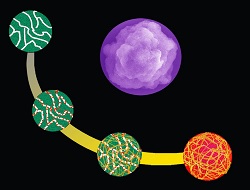 |
| An illustration of the template production process--Courtesy of Max Planck Institute |
German researchers have created a way to use calcium carbonate--a component of many rocks and the shells of marine organisms--to produce hollow microspheres and nanospheres capable of delivering cancer drugs to a specific target in the body.
The porous CaCO3 spheres developed by Helmuth Möhwald and team at the Max Planck Institute of Colloids and Interfaces in Potsdam, Germany, act as templates for hollow balls able to absorb either drugs or drug-carrying nanoparticles and release them safely at the tumor site, according to the institute. The process by which the scientists make the spheres allows for a variety of shapes and sizes to fit different functions.
The spheres can range in size from a few hundred nanometers to several micrometers--a broad span--and can be decomposed by different methods, such as light or chemical processes, when the vehicle reaches its target. Thus, the platform is capable of delivering toxic cancer drugs to the target with minimal harm to healthy cells.
To make the delivery vehicles, the researchers wrapped the calcium carbonate templates in a protein web, then dissolved the templates with acid. Only the protein web remains, which can encapsulate the necessary chemotherapy drugs.
"We can very easily combine substances to form a multifunctional unit and tailor their chemical and physical properties to the required function," Möhwald said. "Whether or not industry will adopt the method and develop it further to application maturity remains an open question."
- here's the Max Planck Institute report